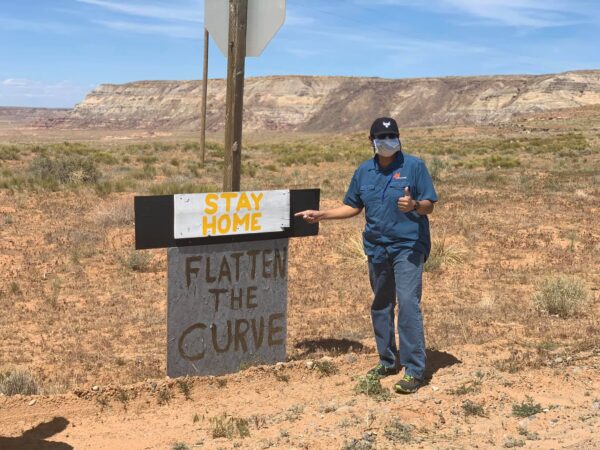
- Details
- By Levi Rickert
Preliminary reports indicate over 500 have recovered
WINDOW ROCK, Ariz. – The Navajo Department of Health in coordination with the Navajo Epidemiology Center and the Navajo Area Indian Health Service reported 141 new cases of COVID-19 for the Navajo Nation, and a total of 127 deaths as of Thursday. Preliminary reports from a few health care facilities indicate that approximately 515 individuals have recovered from COVID-19, with more reports still pending.
This week, the Navajo Epidemiology Center worked closely with healthcare providers to conduct a quality assurance assessment on the number of COVID-19 cases. Due to cross jurisdictional challenges and longer than normal verification processes, an additional 99 previously unreported positive cases were identified and added to the overall total. As a result, the total number of positive COVID-19 cases for the Navajo Nation has reached 3,632.
The 3,632 confirmed positive cases on the Navajo Nation include the following counties:
- Apache County, AZ: 948
- McKinley County, NM: 928
- Navajo County, AZ: 757
- San Juan County, NM: 428
- Coconino County, AZ: 353
- San Juan County, UT: 126
- Cibola County, NM: 37
- Sandoval County, NM: 26
- Socorro County, NM: 26
- Bernalillo County: 3
On Thursday, Navajo Nation President Jonathan Nez and Vice President Myron Lizer announced another Public Health Emergency Order to implement a 57-hour weekend lockdown from May 15 to May 18, starting 8:00 p.m. (MDT) on Friday to 5:00 a.m. (MDT) on Monday, and to close all essential businesses due to the community spread of COVID-19.
In regards to the increase in COVID-19 cases, President Nez stated that early projections from health care experts in March, showed that the Navajo Nation would reach its peak in the number of new cases in mid-May.
“The projections from health care experts seem to be accurate because we are seeing a peak in numbers now and we are hopeful that it will begin to flatten and eventually decline. The weekend lockdown is to further restrict the movement of individuals on the Nation and to and from border towns. The number of COVID-19 positive cases and the number of fatalities continues to increase because individuals continue to leave their homes, many on weekends to avoid the weekend lockdowns. We will overcome COVID-19, but it’s going to be a much longer process as long as people continue to travel unnecessarily. It’s up to us to flatten the curve and bring the numbers down by staying home,” President Nez said.
For more information including reports, helpful prevention tips, and more resources, please visit the Navajo Department of Health’s COVID-19 website at http://www.ndoh.navajo-nsn.gov/COVID-19. To contact the main Navajo Health Command Operations Center, please call (928) 871-7014.
_________________________________________________________________
To Donate to the Navajo Nation
The official webpage for donations to the Navajo Nation, which has further details on how to support the Nation’s Dikos Ntsaaígíí-19 (COVID-19) efforts is: http://www.nndoh.org/donate.html.
_________________________________________________________________
For More Information
For more information including reports, helpful prevention tips, and more resources, please visit the Navajo Department of Health’s COVID-19 website at http://www.ndoh.navajo-nsn.
For up to date information on impact the coronavirus pandemic is having in the United States and around the world go to: https://www.worldometers.info/coronavirus/country/us/?
More Stories Like This
Native News Weekly (August 25, 2024): D.C. BriefsUS Presidents in Their Own Words Concerning American Indians
Native News Weekly (December 14, 2025): D.C. Briefs
Wounded Knee Massacre Site Protection Bill Passes Congress
Two Murdered on Colville Indian Reservation
Help us defend tribal sovereignty.
At Native News Online, our mission is rooted in telling the stories that strengthen sovereignty and uplift Indigenous voices — not just at year’s end, but every single day.
Because of your generosity last year, we were able to keep our reporters on the ground in tribal communities, at national gatherings and in the halls of Congress — covering the issues that matter most to Indian Country: sovereignty, culture, education, health and economic opportunity.
That support sustained us through a tough year in 2025. Now, as we look to the year ahead, we need your help right now to ensure warrior journalism remains strong — reporting that defends tribal sovereignty, amplifies Native truth, and holds power accountable.
 The stakes couldn't be higher. Your support keeps Native voices heard, Native stories told and Native sovereignty defended.
The stakes couldn't be higher. Your support keeps Native voices heard, Native stories told and Native sovereignty defended.
Stand with Warrior Journalism today.
Levi Rickert (Potawatomi), Editor & Publisher

